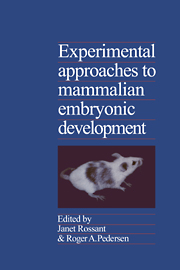Book contents
- Frontmatter
- Contents
- Preface
- Contributors
- Cellular aspects
- Molecular and biochemical aspects
- Toward a genetic understanding of development
- 13 Evidences and consequences of differences between maternal and paternal genomes during embryogenesis in the mouse
- 14 Mutations and chromosomal abnormalities: How are they useful for studying genetic control of early mammalian development?
- 15 Production of permanent cell lines from early embryos and their use in studying developmental problems
- 16 Integration and expression of genes introduced into mouse embryos
- Index
13 - Evidences and consequences of differences between maternal and paternal genomes during embryogenesis in the mouse
from Toward a genetic understanding of development
Published online by Cambridge University Press: 31 March 2010
- Frontmatter
- Contents
- Preface
- Contributors
- Cellular aspects
- Molecular and biochemical aspects
- Toward a genetic understanding of development
- 13 Evidences and consequences of differences between maternal and paternal genomes during embryogenesis in the mouse
- 14 Mutations and chromosomal abnormalities: How are they useful for studying genetic control of early mammalian development?
- 15 Production of permanent cell lines from early embryos and their use in studying developmental problems
- 16 Integration and expression of genes introduced into mouse embryos
- Index
Summary
Introduction
The purpose of this chapter is to draw attention to recent investigations that suggest differential roles for paternal and maternal genomes during embryogenesis in the mouse. It appears that while homologous chromosomes are spatially segregated during oogenesis and spermatogenesis, they are subjected to modifications that subsequently evoke different responses at later events throughout development. Hence, differential gene expression during development may be controlled in a major way by specific modifications of homologous chromosomes prior to fertilization.
Recent studies demonstrate that development to term requires the presence of both a maternal genome and a paternal genome (McGrath and Solter 1984a; Surani, Barton, and Norris 1984). Organized growth and development to term cannot be achieved if the embryonic genome lacks the chromosomal complement from either parent, even though such embryonic cells can proliferate, differentiate, and give rise to a full range of cell types under some circumstances. Hence, paternal and maternal genomes must act in concert to allow embryonic development to progress to term. In the account that follows, I hope to show that distinct functions are apparently dependent on the different parental origins of the chromosomes. Aspects of the heritability of this information and its use during development and the probable time of reversal or reintroduction of chromosome modifications during gametogenesis will also be discussed.
Genetic constitution and development: roles of paternal and maternal genomes
Experimental Approaches
Clear evidence of differences in the influences of paternal and maternal genomes on embryonic development has recently been obtained by altering the genetic constitution of eggs and embryos. Many aspects of this work depend on the ability to carry out micromanipulations of eggs and embryos.
- Type
- Chapter
- Information
- Experimental Approaches to Mammalian Embryonic Development , pp. 401 - 436Publisher: Cambridge University PressPrint publication year: 1987
- 9
- Cited by



